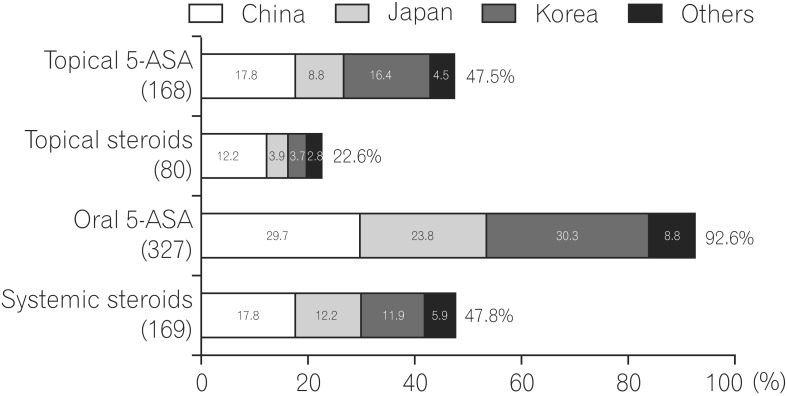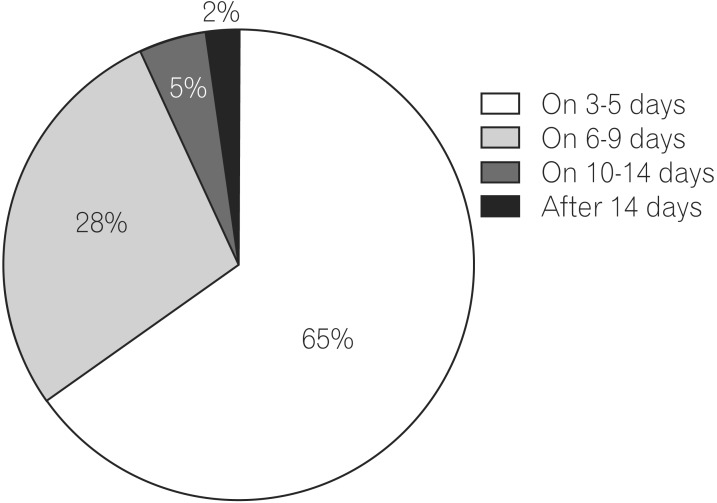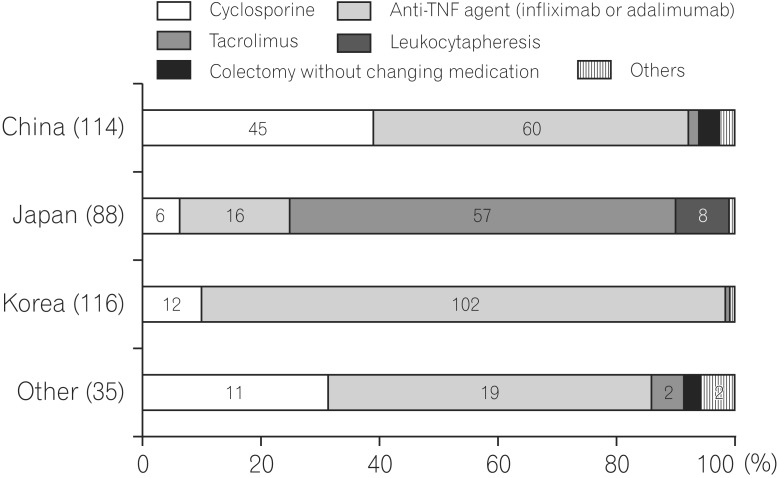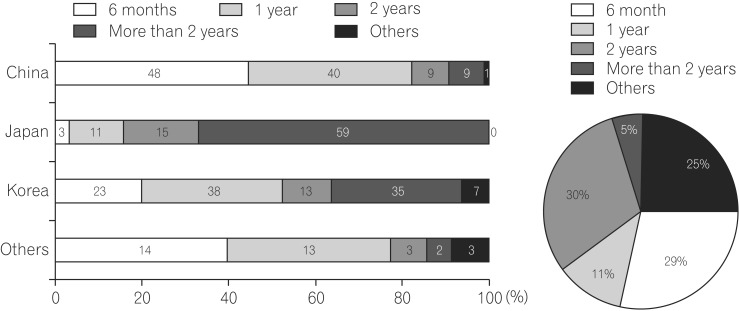Treatment of inflammatory bowel disease in Asia: the results of a multinational web-based survey in the 2nd Asian Organization of Crohn's and Colitis (AOCC) meeting in Seoul
- Affiliations
-
- 1Department of Gastroenterology and Hepatology, Sapporo Medical University, School of Medicine, Sapporo, Japan. hiropynakase@gmail.com
- 2Department of Internal Medicine, Korea University College of Medicine, Seoul, Korea.
- 3Department of Gastroenterology, Asan Medical Center, University of Ulsan College of Medicine, Seoul, Korea.
- 4Department of Internal Medicine, Yonsei University College of Medicine, Seoul, Korea.
- 5Department of Internal Medicine, Konyang University College of Medicine, Daejeon, Korea.
- 6Department of Internal Medicine, Hanyang University Guri Hosptial, Guri, Korea.
- KMID: 2354965
- DOI: http://doi.org/10.5217/ir.2016.14.3.231
Abstract
- BACKGROUND/AIMS
Inflammatory bowel disease (IBD) management guidelines have been released from Western countries, but no adequate data on the application of these guidelines in Asian countries and no surveys on the treatment of IBD in real practice exist. Since there is a growing need for a customized consensus for IBD treatment in Asian countries, Asian Organization of Crohn's and Colitis performed a multinational survey of medical doctors who treat IBD patients in Asian countries.
METHODS
A questionnaire was developed between August 2013 and November 2013. It was composed of 4 domains: personal information, IBD diagnosis, IBD treatment, and quality of IBD care. Upon completion of the questionnaire, a web-based survey was conducted between 17 March 2014 and 12 May 2014.
RESULTS
In total, 353 medical doctors treating IBD from ten Asian countries responded to the survey. This survey data suggested a difference in available medical treatments (budesonide, tacrolimus) among Asian countries. Therapeutic strategies regarding refractory IBD (acute severe ulcerative colitis [UC] refractory to intravenous steroids and refractory Crohn's disease [CD]) and active UC were coincident, however, induction therapies for mild to moderate inflammatory small bowel CD are different among Asian countries.
CONCLUSIONS
This survey demonstrated that current therapeutic approaches and clinical management of IBD vary among Asian countries. Based on these results and discussions, we hope that optimal management guidelines for Asian IBD patients will be developed.
Keyword
MeSH Terms
Figure
Cited by 9 articles
-
Drug therapy and monitoring for inflammatory bowel disease: a multinational questionnaire investigation in Asia
Chenwen Cai, Juntao Lu, Lijie Lai, Dongjuan Song, Jun Shen, Jinlu Tong, Qing Zheng, Kaichun Wu, Jiaming Qian, Zhihua Ran
Intest Res. 2022;20(2):213-223. doi: 10.5217/ir.2021.00031.Improving the quality of care for inflammatory bowel disease
Byong Duk Ye, Simon Travis
Intest Res. 2019;17(1):45-53. doi: 10.5217/ir.2018.00113.Predicting outcomes to optimize disease management in inflammatory bowel disease in Japan: their differences and similarities to Western countries
Taku Kobayashi, Tadakazu Hisamatsu, Yasuo Suzuki, Haruhiko Ogata, Akira Andoh, Toshimitsu Araki, Ryota Hokari, Hideki Iijima, Hiroki Ikeuchi, Yoh Ishiguro, Shingo Kato, Reiko Kunisaki, Takayuki Matsumoto, Satoshi Motoya, Masakazu Nagahori, Shiro Nakamura, Hiroshi Nakase, Tomoyuki Tsujikawa, Makoto Sasaki, Kaoru Yokoyama, Naoki Yoshimura, Kenji Watanabe, Miiko Katafuchi, Mamoru Watanabe, Toshifumi Hibi
Intest Res. 2018;16(2):168-177. doi: 10.5217/ir.2018.16.2.168.Nonimmunity against hepatitis B virus infection in patients newly diagnosed with inflammatory bowel disease
Seong Jae Yeo, Hyun Seok Lee, Byung Ik Jang, Eun Soo Kim, Seong Woo Jeon, Sung Kook Kim, Kyeong Ok Kim, Yoo Jin Lee, Hyun Jik Lee, Kyung Sik Park, Yun Jin Jung, Eun Young Kim, Chang Heon Yang,
Intest Res. 2018;16(3):400-408. doi: 10.5217/ir.2018.16.3.400.Outcomes of limited period of adalimumab treatment in moderate to severe Crohn's disease patients: Taiwan Society of Inflammatory Bowel Disease Study
Wei-Chen Lin, Jen-Wei Chou, Hsu-Heng Yen, Wen-Hung Hsu, Hung-Hsin Lin, Jen-Kou Lin, Chiao-Hsiung Chuang, Tien-Yu Huang, Horng-Yuan Wang, Shu-Chen Wei, Jau-Min Wong
Intest Res. 2017;15(4):487-494. doi: 10.5217/ir.2017.15.4.487.Results of the first survey for the current status of inflammatory bowel disease management in Asian countries
Ji Won Kim
Intest Res. 2016;14(3):199-201. doi: 10.5217/ir.2016.14.3.199.Infectious complications in patients with inflammatory bowel disease in Asia: the results of a multinational web-based survey in the 8th Asian Organization for Crohn’s and Colitis meeting
Yu Kyung Jun, Seong-Joon Koh, Dae Seong Myung, Sang Hyoung Park, Choon Jin Ooi, Ajit Sood, Jong Pil Im
Intest Res. 2023;21(3):353-362. doi: 10.5217/ir.2023.00013.Treatment of inflammatory bowel disease–Asian perspectives: the results of a multinational web-based survey in the 8th Asian Organization for Crohn’s and Colitis meeting
Eun Mi Song, Soo-Young Na, Sung Noh Hong, Siew Chien Ng, Tadakazu Hisamatsu, Byong Duk Ye
Intest Res. 2023;21(3):339-352. doi: 10.5217/ir.2022.00135.How have treatment patterns for patients with inflammatory bowel disease changed in Asian countries?
Jihye Park
Intest Res. 2023;21(3):275-276. doi: 10.5217/ir.2023.00061.
Reference
-
1. Ng SC, Tang W, Ching JY, et al. Incidence and phenotype of inflammatory bowel disease based on results from the Asiapacific Crohn’s and colitis epidemiology study. Gastroenterology. 2013; 145:158–165. PMID: 23583432.
Article2. Prideaux L, Kamm MA, De Cruz PP, Chan FK, Ng SC. Inflammatory bowel disease in Asia: a systematic review. J Gastroenterol Hepatol. 2012; 27:1266–1280. PMID: 22497584.
Article3. Ng SC, Tang W, Leong RW, et al. Environmental risk factors in inflammatory bowel disease: a population-based case-control study in Asia-Pacific. Gut. 2015; 64:1063–1071. PMID: 25217388.
Article4. Feagan BG, Macdonald JK. Oral 5-aminosalicylic acid for induction of remission in ulcerative colitis. Cochrane Database Syst Rev. 2012; 10:CD000543. PMID: 23076889.
Article5. Minami N, Yoshino T, Matsuura M, et al. Tacrolimus or infliximab for severe ulcerative colitis: short-term and long-term data from a retrospective observational study. BMJ Open Gastroenterol. 2015; 2:e000021.
Article6. Nakase H, Yoshino T, Matsuura M. Role in calcineurin inhibitors for inflammatory bowel disease in the biologics era: when and how to use. Inflamm Bowel Dis. 2014; 20:2151–2156. PMID: 25029618.
Article7. Timmer A, McDonald JW, Tsoulis DJ, Macdonald JK. Azathioprine and 6-mercaptopurine for maintenance of remission in ulcerative colitis. Cochrane Database Syst Rev. 2012; 9:CD000478. PMID: 22972046.
Article8. Hawthorne AB, Logan RF, Hawkey CJ, et al. Randomised controlled trial of azathioprine withdrawal in ulcerative colitis. BMJ. 1992; 305:20–22. PMID: 1638191.
Article9. Sandborn WJ. A review of immune modifier therapy for inflammatory bowel disease: azathioprine, 6-mercaptopurine, cyclosporine, and methotrexate. Am J Gastroenterol. 1996; 91:423–433. PMID: 8633486.10. Cuffari C, Present DH, Bayless TM, Lichtenstein GR. Optimizing therapy in patients with pancolitis. Inflamm Bowel Dis. 2005; 11:937–946. PMID: 16189424.
Article11. Travis SP, Stange EF, Lémann M, et al. European evidencebased Consensus on the management of ulcerative colitis: current management. J Crohns Colitis. 2008; 2:24–62. PMID: 21172195.
Article12. Nakase H, Honzawa Y, Toyonaga T, et al. Diagnosis and treatment of ulcerative colitis with cytomegalovirus infection: importance of controlling mucosal inflammation to prevent cytomegalovirus reactivation. Intest Res. 2014; 12:5–11. PMID: 25349558.
Article13. Hida N, Nakamura S, Hahm KB, et al. A questionnaire-based survey on the diagnosis and management of inflammatory bowel disease in East Asian countries in 2012. Digestion. 2014; 89:88–103. PMID: 24458117.
Article14. Yoshino T, Nakase H, Ueno S, et al. Usefulness of quantitative real-time PCR assay for early detection of cytomegalovirus infection in patients with ulcerative colitis refractory to immunosuppressive therapies. Inflamm Bowel Dis. 2007; 13:1516–1521. PMID: 17828781.
Article15. Zachos M, Tondeur M, Griffiths AM. Enteral nutritional therapy for induction of remission in Crohn’s disease. Cochrane Database Syst Rev. 2007; CD000542. DOI: 10.1002/14651858.CD000542.pub2. PMID: 17253452.
Article16. Louis E, Michel V, Hugot JP, et al. Early development of stricturing or penetrating pattern in Crohn’s disease is influenced by disease location, number of flares, and smoking but not by NOD2/CARD15 genotype. Gut. 2003; 52:552–557. PMID: 12631668.
Article17. Allez M, Lemann M, Bonnet J, Cattan P, Jian R, Modigliani R. Long term outcome of patients with active Crohn’s disease exhibiting extensive and deep ulcerations at colonoscopy. Am J Gastroenterol. 2002; 97:947–953. PMID: 12003431.
Article18. Lakatos PL, Czegledi Z, Szamosi T, et al. Perianal disease, small bowel disease, smoking, prior steroid or early azathioprine/ biological therapy are predictors of disease behavior change in patients with Crohn’s disease. World J Gastroenterol. 2009; 15:3504–3510. PMID: 19630105.
Article19. Dubinsky MC. Serologic and laboratory markers in prediction of the disease course in inflammatory bowel disease. World J Gastroenterol. 2010; 16:2604–2608. PMID: 20518081.
Article20. Louis E, Mary JY, Vernier-Massouille G, et al. Maintenance of remission among patients with Crohn’s disease on antimetabolite therapy after infliximab therapy is stopped. Gastroenterology. 2012; 142:63–70. PMID: 21945953.
Article21. Brooks AJ, Sebastian S, Cross SS, et al. Outcome of elective withdrawal of anti-tumour necrosis factor-α therapy in patients with Crohn’s disease in established remission [published online ahead of print May 18, 2015]. J Crohns Colitis. DOI: 10.1016/j.crohns.2014.09.007.
Article22. Yanai H, Lichtenstein L, Assa A, et al. Levels of drug and antidrug antibodies are associated with outcome of interventions after loss of response to infliximab or adalimumab. Clin Gastroenterol Hepatol. 2015; 13:522–530. PMID: 25066837.
Article23. Guerra I, Bermejo F. Management of inflammatory bowel disease in poor responders to infliximab. Clin Exp Gastroenterol. 2014; 7:359–367. PMID: 25258548.24. Panés J, Bouzas R, Chaparro M, et al. Systematic review: the use of ultrasonography, computed tomography and magnetic resonance imaging for the diagnosis, assessment of activity and abdominal complications of Crohn’s disease. Aliment Pharmacol Ther. 2011; 34:125–145. PMID: 21615440.
Article25. Ordás I, Rimola J, Rodríguez S, et al. Accuracy of magnetic resonance enterography in assessing response to therapy and mucosal healing in patients with Crohn’s disease. Gastroenterology. 2014; 146:374–382. PMID: 24177375.
Article
- Full Text Links
- Actions
-
Cited
- CITED
-
- Close
- Share
- Similar articles
-
- Diagnosis of inflammatory bowel disease in Asia: the results of a multinational web-based survey in the 2nd Asian Organization for Crohn's and Colitis (AOCC) meeting in Seoul
- Diagnosis of inflammatory bowel disease–Asian perspectives: the results of a multinational web-based survey in the 8th Asian Organization for Crohn’s and Colitis meeting
- Erratum: Treatment of inflammatory bowel disease in Asia: the results of a multinational web-based survey in the 2(nd) Asian Organization for Crohn's and Colitis (AOCC) meeting in Seoul
- Treatment of inflammatory bowel disease–Asian perspectives: the results of a multinational web-based survey in the 8th Asian Organization for Crohn’s and Colitis meeting
- Quality of care in inflammatory bowel disease in Asia: the results of a multinational web-based survey in the 2nd Asian Organization of Crohn's and Colitis (AOCC) meeting in Seoul








